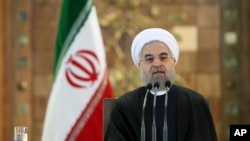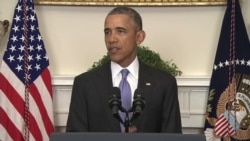Iran's Foreign Ministry called new U.S. sanctions targeting the country's ballistic missile program illegitimate.
Ministry spokesman Hossein Jaber Ansari said Monday that Iran will respond by boosting efforts in its legal ballistic missile program and promoting its defense capabilities.
Iran drew condemnation from the U.S. and other Western powers for two ballistic missile tests late last year they said violated U.N. Security Council resolutions. Iran defended the tests as a matter of national security.
The U.S. enacted new measures Sunday against five Iranian nationals and a network of companies with links to banned missile activity.
WATCH: President Barack Obama credits diplomacy after historic developments in Iran
President Barack Obama said his government will "vigorously" enforce sanctions against Iran's ballistic missile program.
"Iran's recent missile test, for example, was a violation of its international obligations and as a result the United States is imposing sanctions on individuals and companies working to advance Iran's ballistic missile program. And we are going to remain vigilant about it," he said.
The U.S. Treasury Department said the five Iranians worked to get missile components for Iran, as did the network of companies based In the United Arab Emirates and China that used third parties to try to deceive foreign suppliers and hide the identity of who would ultimately be using the materials.
The announcement came a day after the U.S. agreed to lift sanctions related to Iran's nuclear program under an international deal reached in July, and hours after confirmation that several Americans held captive in Iran had been released.
“Iran’s ballistic missile program poses a significant threat to regional and global security, and it will continue to be subject to international sanctions,” said Adam Szubin, acting Under Secretary for Terrorism and Financial Intelligence, in a statement issued by the Treasury Department.
WATCH: Related video of Iran prisoner release
Iranian President Hassan Rouhani said Monday that Tehran would uphold its end of the nuclear deal as long as the "other side" does, according to state news agency IRNA. The agreement was reached in July 2015 after negotiations between Iran and the P5+1, which includes China, France, Russia, the United Kingdom, the United States and Germany.
Speaking at a meeting with Yukiya Amano, the visiting head of the International Atomic Energy Agency, Rouhani added that Iran is committed "not to seek weapons of mass destruction."








